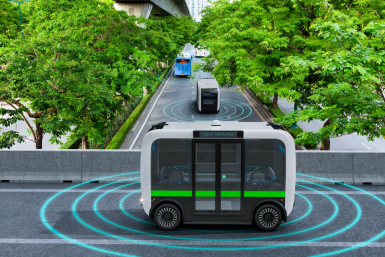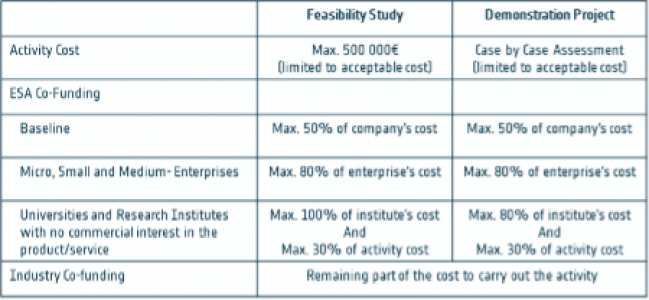This call is part of the umbrella of “Commercial Applications of Space-Enabled Robotics” thematic call for proposals.
This Call for Proposals invites proposals for Feasibility Studies and Demonstration Projects for services that combine the use of satellite technologies and robotics for downstream services for transport and logistics.
‘Robotics’ is here defined to include physical robots, autonomous drones, machines and vehicles, and precursory solutions or those that enable these (e.g., perception and navigation systems for autonomous vehicle services, connectivity solutions to enable tele-operated robotics-).
Within the context of transport and logistics, the intention is to support the study, development and demonstration of autonomous vehicle services and precursors (including tele-operated vehicles) for commercial services in this arena, with particular focus on the most accessible markets for such solutions.
These could be in the domain of delivery services, public transportation, long-haul trucking, industrial settings, campus and controlled environments, short-sea shipping, inland waterway transport, and beyond. Autonomous services may relate to vehicles on land, air, and sea.
Value of space
Satellite Positioning can provide coarse to high accuracy positioning information to autonomous vehicles, vessels and drones operating in outdoor spaces. This can be used for navigation, geo- and timestamping of collected data, time-synchronisation of networked vehicles, and/or determination of speed and heading. Satellite positioning could be combined with inertial and alternative positioning techniques to support effective navigation. Augmentation of GNSS can offer higher positioning accuracies via solutions such as Galileo HAS (High Accuracy Service), RTK (Real-Time Kinematic), or otherwise, with the selection dependent on the service requirements.
Satellite Communications provide data, video and voice communications and may add value to applications implemented in the following service provision scenarios:
Environments that have inadequate, unreliable, compromised, or altogether absent mobile cellular connectivity
- Mobile services that operate across regions with varying cellular connectivity quality (good in certain areas, poor in others…) and require continuous coverage and availability
- Services that have high security, robustness and resilience requirements may benefit from satellite communications for redundancy in compromised or unforeseen circumstances
- These may be pertinent for drone operations in rural areas, and autonomous transport in any of the above given circumstances. New developments in satellite communications may also be exploited, such as Low-Earth Orbit (LEO) Broadband satellite constellations, to enable certain services with demanding performance or cost constraints
Satellite Earth Observation - it is expected that satellite Earth observation could support autonomous vehicle solutions at the service level i.e. providing complementary or enabling datasets such as mapping data to support the navigation of the vehicle, vessel or drone in certain environments. Satellite Earth observation data could support with optical, radar, meteorology data, or combinations thereof.
Spaceflight Technology Spin-Outs - applications of robotics developed for use in space (and other astronomical objects) that also have commercial applications on Earth, i.e. Spaceflight Spin-Outs, are also considered eligible. This could relate to tele-robotic solutions and algorithms (perception, planning, control etc) developed for autonomy of space robotics that have applications on Earth, or otherwise.
What we look for
We look for promising business ideas addressing topics of relevance or related areas that propose:
- attractive market opportunities, identified customer needs and customer engagement
- commercially-viable service concepts
- technically feasible solutions
- added value of space data or technology
- motivated teams with business, technical, and financial expertise
What we offer
We offer funding and support to companies, both for business case assessment and for the development of new, space-based services. Our offer includes:
- zero-equity funding*
- technical and commercial guidance
- access to our network and partners
- ESA brand credibility
- *(50-80% depending on SME Status and Member State Approval)
ESA tender information
The initiative is open to the submission of proposals for Feasibility Studies and Demonstration Projects:
- Feasibility Studies - which provide the preparatory framework to identify, analyse and define new potentially sustainable services
- Demonstration Projects - dedicated to the implementation and demonstration of pre-operational services
How to Apply
Register your team on esa-star Registration today. If your team is made up of more than one company or organisation, each entity will need to register.
Scroll down to the ‘Downloads’ section of this webpage to download the official documents. Official documents include an Activity Description (including the scope of the call, procurement approach…), an Annex (including relevant use-cases), and other supporting materials (e.g. webinar slides, if applicable)
Download the Activity Pitch Questionnaire template and submit your pitch as instructed in the Activity Pitch Questionnaire guidelines, through the online form.
ESA will evaluate your pitch. Teams whose pitches are positively evaluated will be invited to prepare an Outline Proposal and then a Full Proposal. Teams must obtain a Letter of Authorisation from their respective National Delegation before submitting a Full Proposal. Contact details of all National Delegates can be found here: National Delegation(s).
Authorisation of funding
This opportunity is open to companies that intend to develop space-enabled services and products related, but not restricted, to the topics of relevance outlined above. To be eligible for funding, your team must be based in one of the following countries: Austria, Belgium, Czech Republic, Denmark, Estonia, Finland, France, Germany, Hungary, Ireland, Italy, Lithuania, Luxembourg, Netherlands, Netherlands, Norway, Poland, Portugal, Romania, Slovenia, Sweden, Switzerland and United Kingdom. Teams can involve non-European entities, but their contribution to the activity cannot be funded by ESA. Authorisation of Funding letters from the corresponding National Delegations are required as part of the application.
WEBINAR
A webinar is planned for 25 April 2024, 11:00 – 12:00 CEST. Please use the button at the top of page to register.
Webinar speakers: Eduardo Green from the City of Amsterdam (Gementee Amsterdam).




